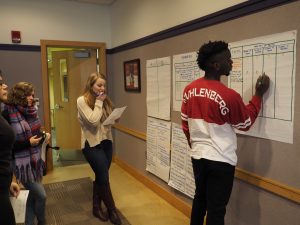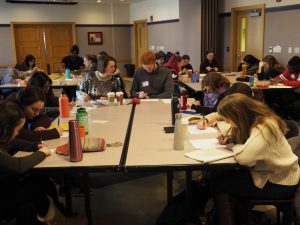Fifty student workers and leaders of activist clubs gathered on Martin Luther King Jr. day for five hours of community organizing training in Seegers.
This was the first time in five years the academic calendar brought students back before MLK Day, which several sponsors on campus used to pay tribute to Martin Luther King Jr.’s ability to organize and change, stated Robin Riley Casey, director of Multicultural Life, one of the sponsors of the event.
“BErg CHANGE, Muhlenberg’s community organizing workshop, was our [Community Engagement and Multicultural Life] attempt at reclaiming a part of the legacy of Dr. Martin Luther King (MLK) that many people don’t acknowledge,” said Riley-Casey. “MLK was a radical activist and a community organizer. He brought people together and built a movement of resistance against racial injustice, unfettered capitalism and the rise of the military machine.”

The training, called BErg CHANGE, was lead by Heather Cronk, who has worked in community organizing for 15 years, almost as long as she has known Beth Halpern, the director of community engagement.
Cronk broke the training into three main sections: public narrative, power mapping and building actions and campaigns, with worksheets handed out explaining each in detail.
Students began the workshop by introducing themselves, the issues they stand for and the challenges of organizing on Muhlenberg’s campus. Club representatives ranged from Residential Services to the Men of Color Network, from Garden Club to Students for Queer Advocacy. Each campaign was written by Cronk on large posters in blue, green and purple markers. Other hand-drawn posters recreated charts and graphs distributed to students on handouts. After students worked in smaller groups, they shared their findings on the posters on the wall.

The section on public narrative featured a discussion of the story of self, the story of now and the story of us, which all intersect to form a public narrative. Cronk focused on ways to convey a campaign and goal that connected to the greater audience.
Morgan Kelly ‘19, who attended Environmental Action, Community Engagement and for her job as a sustainability intern, explained the story of us as: “The emphasis put on yourself and the story you can tell and how that can relate to others and bring them to your campaign and see the change you can make.”
The next session focused on power mapping, which Cronk defined as, “getting a sense for who has the power to make a decision that we want to be made, and how we try to change that person’s mind so that they make that decision.”
Together on a set of axes of influence and allyship, the group plotted important individuals in Muhlenberg Trans Advocacy Coalition’s campaign to gain more gender-neutral bathrooms on campus. Cronk used the campaign as an example because it had a clear goal and a concrete plan. The students of MTAC have secured 17 gender-neutral bathrooms on campus in the last five years.
The final section was on building actions and campaigns, where students discussed in small groups different actions they could take to further their cause and filled out a chart that compared the energy it took to create the predicted outcome, and then discussed effectiveness of different strategies.
I learned a lot about Muhlenberg as a whole…I obviously know all the good things about Berg and how people are so open all the time. Other people have said issues I didn’t know were present on campus before today.
Sarah Krsnak ‘21, who attended for Garden Club, wants to use these tactics to start an on-campus thrift store.
“I know a lot of students here have clothing they’re not wearing or they want new clothing. I’m looking for ways to get started,” said Krsnak. “There’s little presence of student-run businesses on campus and that’s kind of upsetting. I want students to be able to make money out of this thrift store. So I’d like to buy the things back from students for a reduced price so they make a profit and then sell those things in the store.”
At the end, students gave feedback as a group and went over what was most helpful in the workshop.

“Hopefully this can teach us how to get more student engagement and more students involved in general and reach more students and a broader spectrum of people,” said Kelly.
Liv Fargiano ‘22, who attended as part of Alpha Phi Omega service fraternity, walked away with more than organizing strategies.
“I learned a lot about Muhlenberg as a whole because I’m just a freshman. I obviously know all the good things about Berg and how people are so open all the time,” said Fargiano “Other people have said issues I didn’t know were present on campus before hearing about them from people today.”
BErg CHANGE was sponsored by the Office of Community Engagement, the Office of Multicultural Life, Division of Student Affairs, Provost’s Office, Black Students Association and the Men of Color Network.























[…] The original article can be found here. […]